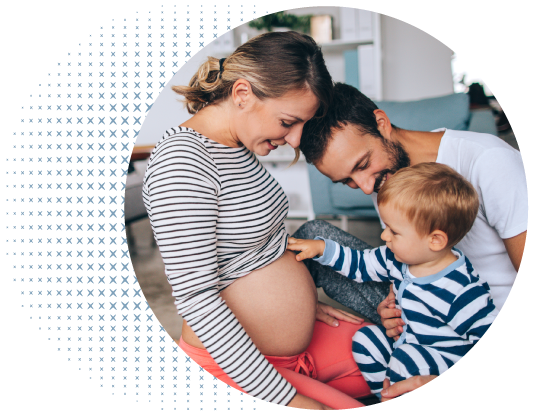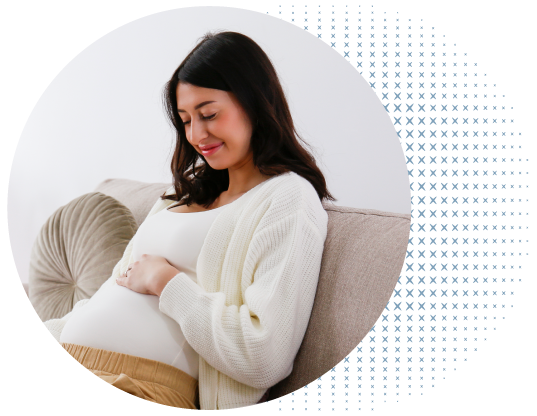Fetal RhD NIPT clinical validation published in Obstetrics & Gynecology
Learn MoreFetal RhD NIPT clinical validation published in Obstetrics & Gynecology
Learn MoreEvery pregnancy deserves Panorama™
Pregnancy can be exciting for families, and also bring concerns about medical decisions or the challenges of parenting. Prenatal screening offers genetic insights early in pregnancy about the health of a pregnant person and their growing baby. Panorama™ noninvasive prenatal test is trusted by 1 in 3 OBGYNs in the US to deliver these insights for more than 1 million families each year1.

#1 NIPT for a reason
EXPERIENCE1
10 YEARS
PEER-REVIEWED PUBLICATIONS2
40+
PATIENTS3
2 MILLION+
included in peer-reviewed publications
The Panorama™ difference
- The only SNP-based NIPT, designed to inform decisions during pivotal moments of pregnancy care.
- A differentiated, highly-accurate screening approach evaluates SNPs – the 1% of our DNA that makes us different from one another – to screen for common trisomies, aneuploidies and microdeletions.
- A sequencing platform of >13K SNPs enables Panorama to deliver a curated prenatal cfDNA screening test that accounts for all ethnicities and population variability.
Validated with clinical rigor
SMART, the largest prospective NIPT study, evaluated the performance of SNP-based NIPT in a real-world population. All results included in the analysis were validated with genetic confirmation.4-6
PATIENTS
20,000+
enrolledSITES
21
global centersOUTCOMES
100%
of patients included in analysis had genetic confirmation>99%
combined sensitivity for trisomies (T21, T18, T13)83%
clinical sensitivity for 22q11.2 deletions (0.5 Mb+ deletions)>95%
positive predictive value (PPV) for trisomy 21ZERO
fetal sex errors in validation studiesConditions Screened For
Panorama screens for common genetic conditions that are caused by extra or missing chromosomes in the baby’s DNA. Because Panorama uses a unique technology to distinguish between the pregnant person’s and the baby’s DNA, it is the only NIPT that tests for triploidy.7 Some conditions, such as Down syndrome, are caused by extra copies of a specific chromosome. Others, such as microdeletions, occur when a chromosome is missing a small piece of genetic information.7
TRISOMIES*
Trisomy 21 (Down syndrome)
Babies with Down syndrome have three copies of chromosome 21 and have intellectual disabilities that range from mild to severe. Children with Down syndrome will need extra medical care depending on the child’s specific health problems. Early intervention has allowed many individuals with Down syndrome to lead healthy and productive lives. The presence of medical conditions, like heart defects, can affect the lifespan in these children and adults; however, most individuals with Down syndrome will live into their 60s. Miscarriage occurs in about 30% of pregnancies with Down syndrome while overall about 1 in 700 babies are born with Down syndrome.
Trisomy 18 (Edwards syndrome)
Babies with trisomy 18 have three copies of chromosome 18 and have severe intellectual disabilities and birth defects typically involving the heart, brain, and kidneys. Babies with trisomy 18 can also have visible birth defects such as an opening in the lip (cleft lip) with or without an opening in the roof of the mouth (cleft palate), a small head, clubbed feet, underdeveloped fingers, and toes, and a small jaw. Unfortunately, most pregnancies with trisomy 18 will miscarry. If born alive, most affected babies with trisomy 18 will pass away within the first few weeks of life. About 10 percent survive to their first birthday. Trisomy 18 occurs in approximately 1 in 3,000 live births.
Trisomy 13 (Patau syndrome)
Babies with trisomy 13 have three copies of chromosome 13 and have severe intellectual disabilities. They often have birth defects involving the heart, brain, and kidneys. Visible abnormalities include extra fingers and/or toes or an opening in the lip, with or without an opening in the palate. Given the severe disabilities, most pregnancies affected by trisomy 13 will miscarry. If born alive, most affected babies with trisomy 13 will pass away within the first few weeks of life. About 10 percent survive to their first birthday. Trisomy 13 occurs in approximately 1 in 5,000 live births.
SEX CHROMOSOME ANEUPLOIDIES**
Monosomy X (Turner syndrome)
Babies with monosomy X are biological females who have one X chromosome instead of two. Unfortunately, a high proportion of pregnancies with monosomy X will result in a miscarriage in the first or second trimester of pregnancy. Babies with monosomy X that make it to term may have heart defects, learning difficulties, and infertility. In most cases, babies with monosomy X will need extra medical care including hormone therapy at various stages of life.
XXY Syndrome (Klinefelter Syndrome)
Babies with XXY syndrome have two X chromosomes and one Y chromosome (XXY). This condition can be associated with learning difficulties and behavioral problems. People with Klinefelter syndrome might be infertile. About 1 in 500 biological males will be born with Klinefelter syndrome.
Triple X syndrome
Babies with Triple X syndrome have three X chromosomes (XXX). Children with this condition could be taller than average and might experience learning difficulties or behavioral problems. Approximately 1 in 800 biological females will be born with three X chromosomes.
XYY Syndrome (Jacob's Syndrome)
Babies with XYY syndrome have one X chromosome and two Y chromosomes (XYY). Most babies with XYY syndrome do not have any birth defects. Children with XYY could be taller than average and have an increased chance for learning, speech, and behavioral problems. Approximately 1 in 1,000 biological males will be born with one X chromosome and two Y chromosomes.
MICRODELETIONS**
22q11.2 deletion syndrome
22q11.2 deletion syndrome, also called DiGeorge syndrome or Velo-Cardio-Facial syndrome (VCFS), is caused by a missing piece of chromosome number 22. About one in every 2,000 babies is born with 22q11.2 deletion syndrome. The majority of children with this disorder have heart defects, immune system problems, and specific facial features. Most children with 22q.11.2 deletion syndrome have mild-to-moderate intellectual disability and speech delays; some will also have low calcium levels, kidney problems, feeding problems, and/or seizures. About one in five children with 22q11.2 deletion syndrome have autism spectrum disorder; 1 in 4 adults with 22q11.2 deletion syndrome have a psychiatric illness, like schizophrenia.
Prader-Willi syndrome†
Prader-Willi syndrome occurs when either a small piece of chromosome 15 is missing or when both copies of chromosome 15 come from the same parent (called uniparental disomy, or UPD). Babies with Prader-Willi syndrome have low muscle tone and problems with growth and feeding. Children with Prader-Willi syndrome have delayed milestones, short stature, rapid weight gain leading to obesity, and intellectual disability. About 1 in 10,000 babies are born with Prader-Willi syndrome.
Angelman syndrome†
Angelman syndrome happens when either a small piece of chromosome 15 is missing, or when both copies of chromosome 15 come from the same parent (called uniparental disomy, or UPD). About 1 in 12,000 babies are born with Angelman syndrome. Babies and children with Angelman syndrome have severe intellectual disability, delayed milestones, seizures, and problems with balance and walking.
1p36 deletion syndrome
1p36 deletion syndrome, also referred to as Monosomy 1p36 syndrome is caused by a missing piece of chromosome 1. Children with 1p36 deletion syndrome have intellectual disabilities. Most have heart defects and weak muscle tone. About half of affected individuals have seizures (epilepsy), behavioral problems, and hearing loss. Some children with 1p36 deletion syndrome also have vision problems or additional birth defects of other organs. About 1 in 5,000 newborn babies has 1p36 deletion syndrome.
Cri-du-chat syndrome
A missing piece of chromosome 5 causes Cri-du-chat syndrome, also called 5p- (5p minus) syndrome. The name “Cri-du-chat” was given to this syndrome due to the high-pitched, cat-like cry that babies with this syndrome often make. Babies with Cri-du-chat syndrome typically have low birth weight, a small head size, and weak muscle tone. Feeding and breathing problems are common in infancy. Children with this disorder have moderate-to-severe intellectual disability, including speech and language delays. They may also have growth delays, behavior problems, and some have curvature of the spine (scoliosis). About one in every 20,000 babies is born with Cri-du-chat syndrome. They may also have heart defects, growth delay, behavior problems and some have curvature of the spine.
TRIPLOIDY**
Only NIPT that tests for triploidy
Babies with triploidy have a complete extra set of chromosomes for a total of 69 chromosomes instead of the usual 46. At 10 weeks gestation, one in 1,000 pregnancies is affected by triploidy. It is extremely rare for these pregnancies to reach term as they typically spontaneously miscarry early in pregnancy. Those few liveborns usually pass away within days of delivery due to heart, brain, and kidney problems. Babies with triploidy also often have birth defects affecting the extremities and face.
Carrying a baby with triploidy can increase a mother’s risk for a variety of conditions: pre-eclampsia (which can lead to seizures) and excessive bleeding after delivery. In rare instances, triploid pregnancies can persist and progress to a type of cancer called choriocarcinoma. Knowing about triploidy allows the physician to monitor the health of the mother appropriately.
Is Panorama™ right for you?
We’re here to help you find out
References
1Internal data on file as of June 2023.
2Natera and non-Natera published peer-reviewed publications.
3Goldring et al. Obstet Gynecol. 2023 Apr 1;141(4):791-800.
4Dar et al. Am J Obstet Gynecol. Published online January 24, 2022. doi:10.1016/j.ajog.2022.01.019.
5Dar et al. Am J Obstet Gynecol. Published online January 13, 2022. doi:10.1016/j.ajog.2022.01.002.
6Norton et al. Perinatal and genetic outcomes associated with no call cfDNA results in 18,497 pregnancies. Society of Maternal-Fetal Medicine, SMFM. Virtual Meeting. Oral Presentation. Jan 25-30, 2021.
7ACOG Practice Bulletin 226. Obstet Gynecol. 2020 Oct;136(4):859-867.
Footnotes
* CA residents: If your clinician ordered screening through the California Prenatal Screening program using Natera's Vasistera™ NIPT, Panorama™ will only screen for supplemental conditions. If this is the case, trisomies 21, 18 and 13, and fetal sex (optional) will be screened using Vasistera™ NIPT and will be reported separately.
** Not available for egg-donor or gestational carrier pregnancies or in cases of dizygotic (nonidentical) twins. Triploidy and microdeletions except for 22q11.2 deletions are not available for monozygotic (identical) twins.
† This test has been validated on full region deletions of Prader-Willi syndrome/Angelman syndrome (PWS/AS) only and might be unable to detect smaller deletions. It has not been validated for other molecular mechanisms which could cause PWS/AS such as uniparental disomy (UPD) or methylation.